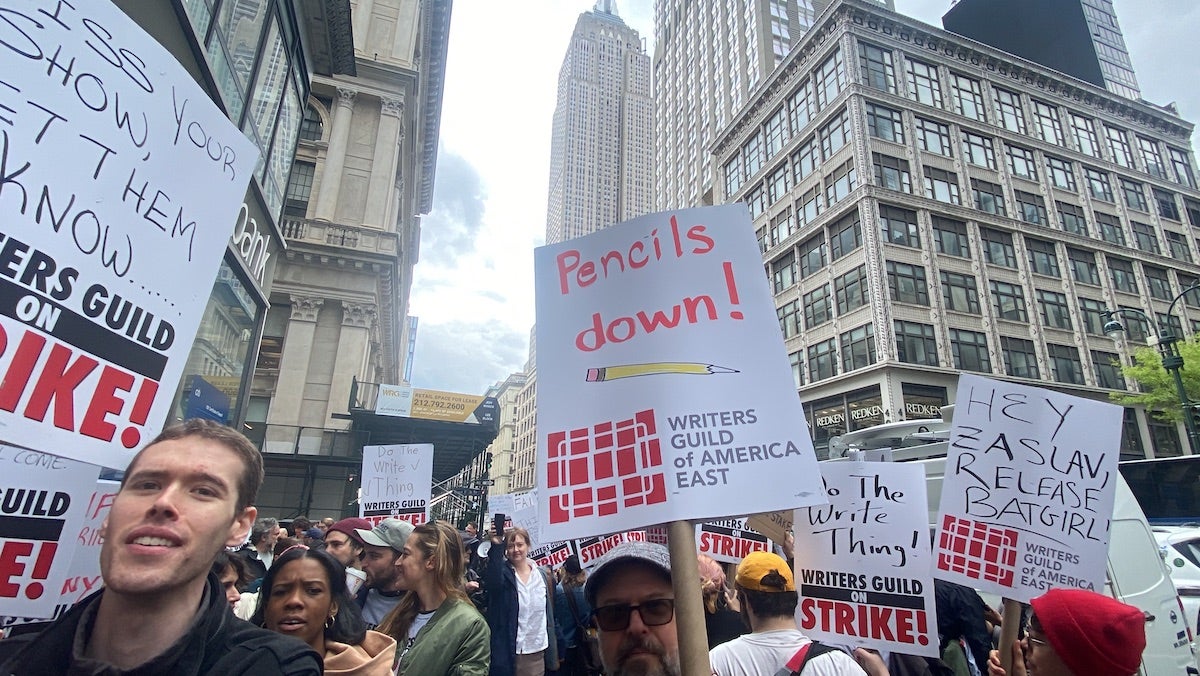
WGA members were motivated and irritated as they began the first wave of strikes in Los Angeles and New York City
“Write down on the signs what show you were working on,” Schulner tells his fellow guild members as the signs get handed out. “Or write down what show was screwing you.”
Schulner, creator of the NBC medical drama “New Amsterdam,” remembers when he helped put together picket signs at the WGA offices for the 2007 writers’ strike. Now, he and thousands of WGA members are back on the picket line more than 15 years later to fight back against what guild leaders call a transformation of writing into “a gig economy inside a union workforce.”
It’s an industry trend that Schulner says has left him feeling more irritated on day one of this strike than he did at the start of the 2007 work stoppage.
“I’m more disappointed and frustrated that the industry has clearly changed so much and the companies are so unwilling to negotiate on so much of the proposal that the Writers Guild put forward,” Schulner told TheWrap. “In 2007, we saw that streaming was going to be the future. The future is here, and the studios are not willing to change with the chaos that it brought.”
After an hour, hundreds of WGA members were marching past the entrance to Sunset Bronson Studios on Van Ness Ave. and across the sidewalk on Sunset Boulevard, drawing honks of support from countless cars driving by. They were joined by members of SAG-AFTRA who brought their own signs showing solidarity with the Writers Guild as well as several members of the WGA negotiating committee, including guild president Meredith Stiehm and chief negotiator Ellen Stutzman.
For weeks, Stiehm and Stutzman led the WGA team in efforts to secure drastic change to not only how writers are compensated, but also how they are hired. When talks started on March 20, studio insiders told TheWrap that they expected that the WGA’s proposals to requiring a minimum number of hired writers on a TV series would be a “non-starter” as the studios would look to protect their control over employment.
That prediction ended up being true, as the Alliance of Motion Picture and Television Producers (AMPTP) said in its statement announcing the end of talks that such proposals on “mandatory staffing” and “duration of employement” were the “primary sticking points” that prevented a deal from being made.
But writer/comedian Adam Conover, a member of the negotiating committee says that beneath the jargon is one simple goal for the WGA: codify the writers room directly into their labor contract.
For decades, such a thing wasn’t necessary as writers rooms were standard practice for television, but Conover said the guild sees Hollywood heading on a path where studios use streaming as a way to render writers rooms obsolete, pushing them into a new normal where showrunners either write entire seasons themselves or hire out a writer or two on a freelance basis to provide scripts here and there.
“The companies didn’t make a counterproposal. They just flat said ‘no,’” he said. “It’s because they don’t want to give the writers any stability. They want us in that position where we feel pressure to deliver just so we don’t make the producer mad. Having writers in that precarious position gives them more power over how they can hire these writers and what they can pay them.”
The scene at Netflix’s office played out at over a dozen backlots and office buildings in Los Angeles and New York on Tuesday.
Outside of Fox Studios, over a hundred WGA members and supporters lined several blocks on Pico Boulevard, cycling past billboards for the network’s “Crime Scene Kitchen” and “Don’t Forget the Lyrics!” with occasional chants roaring, “We are the union, the mighty mighty union.”
Negotiating Committee co-chair Chris Keyser and WGAW secretary-treasurer Betsy Thomas kicked off the first day of the strike outside of Fox Studios, telling reporters that the WGA’s resolve is as strong as it has ever been.
“I’m frustrated and sad that we have to do this, but we absolutely have to do this,” Thomas said. “And I think every single person out here feels the same way. We’re resolved to help each other, protect each other. I think it’s existential for us, and I think the other creatives in this town feel similarly.”
Keyser recounted how the final moments of talks with the AMPTP ended, as it became clear that the two sides were too far apart on how large the scope of the changes brought by the next bargaining agreement would be.
“Some number of hours before deadline, the company came back to us and said, ‘We can make you a slightly better offer… if you take off all the things from the table we don’t want to talk about.’ We couldn’t make that deal. When we said to them, no, they said they have nowhere to go. And at that point, there was no point in continuing,” he said.
The two guild leaders were joined by “Frozen” star and guild member Josh Gad, who acknowledged that he was one of the “lucky ones” who can continue working as an actor.
“A living wage for writers is essential. I don’t think it’s something that should have to be fought for,” Gad told TheWrap. “I think that it’s something that should just be understood as a right that these incredible writers who write the words that we as actors have privilege to say.”
“It’s more about a lot of writers that I’ve been privileged enough to work with coming in and doing mini-rooms, and doing some other things that they, frankly, don’t get paid what they should be getting paid for,” Gad continued. “It’s something that I think if we don’t fight for it now, we’re not going to have another chance to fight for it. So I stand with all these guys, and want them all to get paid what they deserve.”
Over in New York, members of WGA East stood outside of the Peacock NewFronts presentation in Manhattan, where the NBCUniversal streaming service was showcasing new viewing features for its subscribers to the press. Various chants from writers could be heard including, “Hey Peacock, you’re no good, treat your writers like you should,” and signs with jokes like “Fair contract or we’ll spoil ‘Succession.’”
The sight of streaming executives trying to curry the favor of advertisers while writers protested in the streets outside was one that WGA East council member Sasha Stewart found fitting.
“What we’re saying is TV is TV and the Peacock NewFronts, that’s TV,” Stewart, who has written for late-night and scripted comedy shows, told TheWrap. “Its owned by NBCUniversal and so we should have the same rates that we have on Peacock as we do on NBC. And that should count for residuals, that should count for weekly minimums, everything should be the same. And that should count if you’re writing for Seth Meyers’ show on NBC or Amber Ruffin’s show on Peacock.”
It’s likely that these picket lines will be staying for several weeks, possibly through the end of June at the earliest. The AMPTP must now transition to negotiations with the Directors Guild of America next week and later SAG-AFTRA on June 7. Only if and when agreements are reached with those guilds, labor insiders say, will studios likely broach the topic of returning to the negotiating table with the WGA.
This means several weeks of reruns of late-night comedy shows and a slow trickle of stockpiled films and series by studios onto their streaming services, similar to when the COVID-19 pandemic halted Hollywood production in 2020.
The longer the strike goes, the wider the effects a work stoppage will have. A strike that lasts through the whole summer will mean that network and cable channels will have no new fall shows to broadcast. Push the strike beyond that, and eventually the stockpile of shows and movies studios have built up will run out. Films set for production later in the year may be forced to delay, which would lead to movie theaters going back to having to endure months without high-profile tentpole films the way they did through much of last year.
But whether it comes to that, Stewart said, is up to the AMPTP and the studios.
“The strike did not need to happen,” she said. “If they would simply pay us what we are owed, we would not have to strike. The strike could end tomorrow, if they would agree to our terms, if they would agree to even negotiate our terms in a fair way and give us a fair contract.”
“So I don’t know how long this will go on for but I do know that the writers have solidarity,” she continued. “We have truth on our side, we have justice on our side and we will fight for as long as it takes.”
Watch a recap of TheWrap’s coverage of the first day of the writers’ strike below.
For all of TheWrap’s WGA strike coverage, click here.
Related stories:
All the WGA Strike Locations in L.A. and NYC
Hollywood Writers Strike: All the Impacted Shows, From ‘Abbott Elementary’ to ‘Yellowjackets’
The Sticking Points: Writers Guild Breaks Down Why It Couldn’t Reach a Deal With Studios
- timewarnerent.comhttps://timewarnerent.com/author/gleberman1236/
- timewarnerent.comhttps://timewarnerent.com/author/gleberman1236/
- timewarnerent.comhttps://timewarnerent.com/author/gleberman1236/
- timewarnerent.comhttps://timewarnerent.com/author/gleberman1236/



















